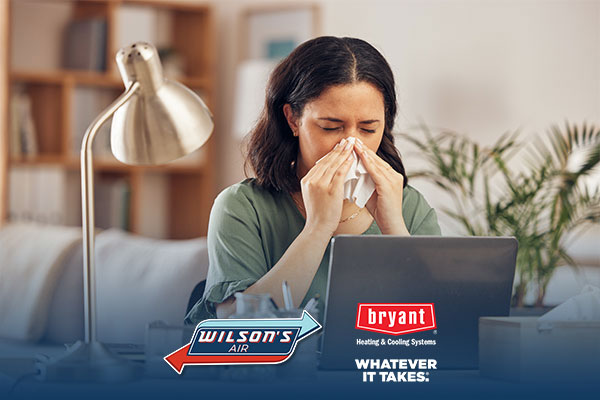How to Pick the Best Air Purifier for Allergies This Spring

As spring unfolds, the anticipation of warmer weather and blooming flowers appeal to almost everyone but allergy sufferers who brace themselves for the onslaught of dreaded seasonal allergies. The key to alleviating this annual discomfort could very well be improving your home’s air quality. In this comprehensive guide, we’ll explore how to pick the best air purifier for allergies, delve into the importance of an indoor air quality test, discuss the air purifier benefits, and examine additional measures to enhance your indoor air quality this spring.
Spring Allergies and Indoor Air Quality
The most common primary triggers for spring allergies are grasses, weeds, and pollen from flowers and trees. While these are outdoor allergens, they can easily make their way indoors through open windows and doors and on clothing, shoes, and pets, significantly impacting indoor air quality. An indoor air quality test can reveal the presence of these allergens in your home, along with other irritants like dust mites, mold spores, and pet dander, which contribute to allergic reactions. Understanding the link between outdoor allergens and your indoor environment is the first step in effectively creating a strategy to combat spring allergies.
How Air Purifiers Combat Allergens
Air purifiers work to filter out microscopic airborne particles, reducing the concentration of allergens in indoor environments. The best air purifier for allergies typically features a High-Efficiency Particulate Air (HEPA) filter, capable of capturing 99.97% of particles as small as 0.3 microns. This includes most allergens, such as pollen, mold spores, dust mite debris, and pet dander. By continuously circulating the air in a room through these filters, an indoor air purifier can significantly reduce the allergens and improve air quality, making it easier for allergy sufferers to breathe.
Selecting the Right Air Purifier for Allergy Relief
When searching for the best air purifier for allergies, consider the following factors to ensure you choose a model that suits your needs:
- Filter Type: Look for air purifiers with HEPA filters. They are the most effective at capturing airborne allergens. Some models also feature additional filters, like activated carbon, which can remove odors and volatile organic compounds (VOCs).
- Room Size Compatibility: Ensure the air purifier rating is for the size of the room. An undersized air purifier won’t be effective in a large space.
- Certifications: Check for certifications such as AHAM Verifide (Association of Home Appliance Manufacturers), which ensures the testing and verification of the air purifier’s performance.
- Noise Level: Opt for a model with a tolerable noise level since air purifiers generally run continuously.
- Maintenance Requirements: When considering the ease of replacing filters and the cost of replacement filters, regular maintenance is crucial. This helps ensure the air purifier can continue to function effectively.
HVAC Maintenance and Managing Allergies
Your home’s heating and air conditioning system plays a pivotal role in managing indoor air quality and your allergies. Regular HVAC maintenance should include replacing filters frequently and cleaning ducts. This not only ensures the system runs efficiently, but can significantly reduce the circulation of allergens in your home. Additionally, incorporating a whole-house air purifier system into your HVAC can provide comprehensive air purification. Air purification benefits all of the rooms in your home and makes it more comfortable.
Additional Air Quality Improvements for Allergy Sufferers
Other than selecting the best air purifier for allergies and maintaining your HVAC system, there are other things to keep in mind. Consider these additional steps to improve indoor air quality:
- Conduct Regular Indoor Air Quality Tests: Monitoring your home’s air quality can help identify specific allergens and pollutants. By staying on top of this, you can take targeted actions and address any issues.
- Keep Windows Closed During High Pollen Counts: Closing windows can prevent outdoor allergens from entering your home.
- Use a Dehumidifier: Reducing indoor humidity levels can help prevent the growth of mold, which is a common allergen.
- Clean Regularly: Frequent vacuuming with a HEPA filter vacuum cleaner and dusting with a damp cloth can reduce the accumulation of allergens.
- Opt for Allergy-Friendly Plants: Some indoor plants can help improve air quality by absorbing pollutants, however, it’s critical to ensure they are not sources of mold growth.
Talk to a Professional
HVAC professionals are invaluable in identifying air quality concerns within your home. They possess the expertise to conduct thorough assessments. These services can include an indoor air quality test, and identifying pollutants and allergens that may affect your indoor environment. These experts can recommend tailored strategies to enhance air quality, including adjustments to your existing HVAC system and advice on selecting the right air purification system. By leveraging their guidance, you can ensure a healthier, allergen-reduced living space tailored to your needs.
Combating spring allergies begins with understanding the connection between outdoor allergens and indoor air quality. It’s also important to implement strategies to reduce allergen levels in your home. Selecting the right air purifier, maintaining your HVAC system, and improving air quality can provide significant relief for allergy sufferers. By contacting the team at Wilson’s Refrigeration and Air, you can start taking these measures. Enjoy the beauty of spring with fewer allergy symptoms and a more comfortable indoor environment and call today.
SCHEDULE ServiceThey came promptly, worked quickly, were very professional and their prices were very fair. I highly recommend them.
Paul Mims



